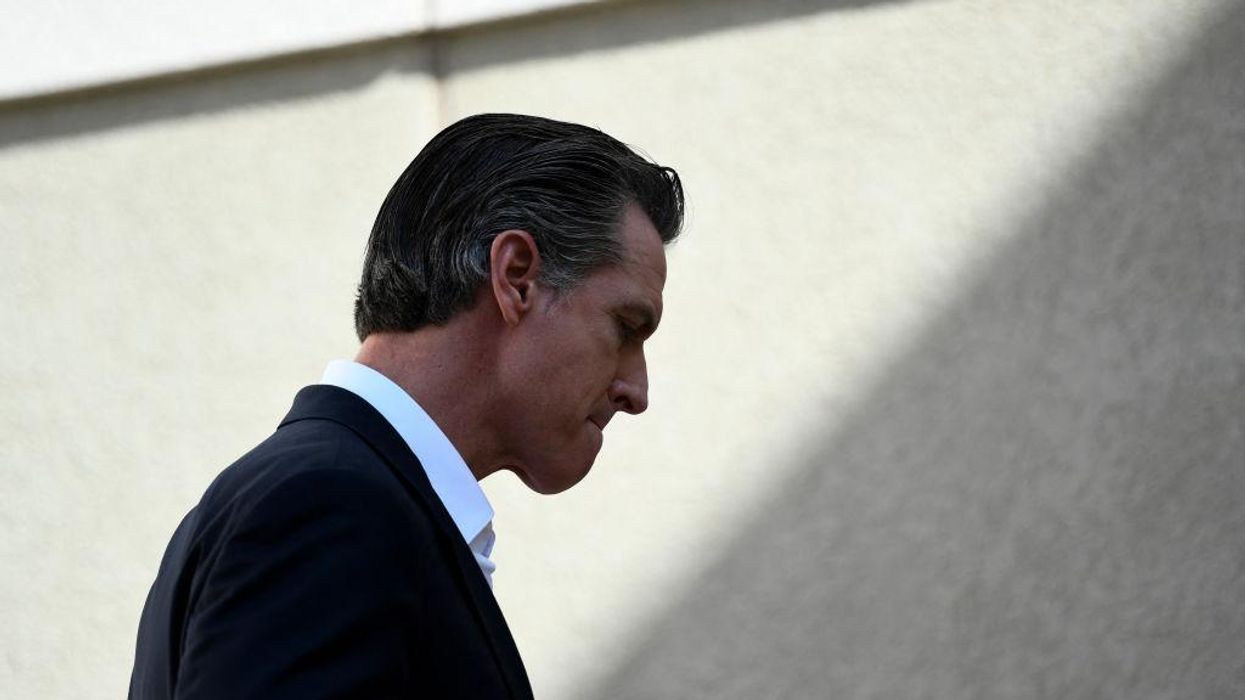
PATRICK T. FALLON/AFP via Getty Images

'The right to keep and bear arms is clearly in the Constitution'
The author of Texas' six-week abortion ban shot back at California Gov. Gavin Newsom (D) this week after he announced plans to use his legislation as a framework to restrict Second Amendment rights in the Golden State, saying the copycat plan would ultimately fail.
Over the weekend, Newsom instructed state lawmakers to craft a bill modeled after the abortion ban that would empower private citizens to file civil lawsuits against anyone "who manufactures, distributes, or sells an assault weapon or ghost gun kit or parts in the State of California."
But Texas state Sen. Bryan Hughes (R) dismissed the liberal governor's efforts on Monday, telling the Houston Chronicle he didn't think his enforcement mechanism would be “effective against firmly established constitutional rights.”
“I would tell Gov. Newsom good luck with that,” Hughes told the outlet.
“If California takes that route, they’ll find that California gun owners will violate the law knowing that they’ll be sued and knowing that the Supreme Court has their back because the right to keep and bear arms is clearly in the Constitution, and the courts have clearly and consistently upheld it," he added.
In Hughes' view, the right to an abortion, though enshrined in by the landmark Supreme Court case Roe v. Wade, is a much less settled constitutional issue than is the right to keep and bear arms.
The Texas abortion law, which prohibits the termination of a pregnancy after fetal cardiac activity is detected, uniquely relies on civil — rather than criminal — enforcement in order to circumvent legal challenges. The Supreme Court declined to block the law on Friday, though it allowed lawsuits against the law to proceed.
Newsom acknowledged that the Supreme Court's ruling was a major motivating factor in his decision to try exploiting the new law for gun restriction purposes.
"I am outraged by yesterday’s U.S. Supreme Court decision allowing Texas’s ban on most abortion services to remain in place, and largely endorsing Texas’s scheme to insulate its law from the fundamental protections of Roe v. Wade," the governor said. "But if states can now shield their laws from review by the federal courts that compare assault weapons to Swiss Army knives, then California will use that authority to protect people’s lives, where Texas used it to put women in harm’s way."
In recent weeks, some on the right, including the California-based Firearms Policy Coalition, expressed concerns that the Texas abortion ban set a dangerous precedent that would soon be used to limit other constitutional rights, and specifically gun rights.
Texas' own solicitor general, Judd Stone II, even seemed to express that view when answering a question from Supreme Court Justice Brett Kavanaugh during oral arguments last month.
“Say everyone who sells an AR-15 is liable for a million dollars to any citizen ... Would that kind of law be exempt from pre-enforcement review in federal court?” Kavanaugh asked.
The Chronicle reported that "Stone answered it would unless Congress modified federal courts’ jurisdiction to do so."
But Hughes' explanation may also hold water.
During oral arguments on another state abortion law earlier this month, Supreme Court Justice Clarence Thomas seemed to indicate that certain constitutional rights, such as the right to bear arms, are stronger than others, such as abortion, since they are clearly and definitively outlined in the Constitution.
"If we were talking about the Second Amendment, I know what we're talking about ... Because it's written, it's there. What specifically is the right here [to abortion] that we're talking about?" he asked U.S. Solicitor General Elizabeth Prelogar.
Prelogar struggled to come up with a concrete answer.